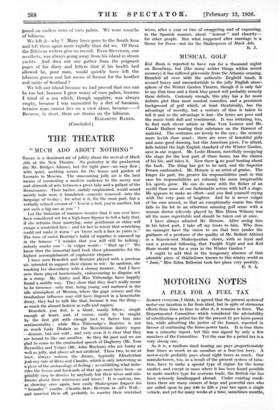THE THEATRE
"MUCH ADO ABOUT NOTHING"
THERE is a dominant air of jollity about the revival of Much Ado at the New Theatre. No pedantry in the production (by Mr. Bridges Adams), but the right pace—an easy flow ; with quiet, soothing scenes for the house and garden of Leonato in Messina. The unassuming jolly air is the best means of reconciling a modern audience to the merry war and skirmish of wits between a great lady and a gallant of the Renaissance. Their banter, unduly emphasized, would sound merely rude were it translated—conceits removed—into the language of to-day ; for what is it, for the most part, but a verbally refined version of" You're a fool, you're another, but
n ot such a big one as you " ?
Let the historian of manners wonder that it can ever have been considered wit for a high-born Signior to tell a lady that, if she refrains from marrying, some gentleman or other will escape a scratched face ; and for her to retort that scratching could not make it worse "an 'twere such a face as yours is." The tone of sweet Beatrice's habit of repartee is summed up in the famous "I wonder that you will still be talking : _nobody marks you "—in vulgar words : "Shut up ! " We know that the immortal bard took these pleasantries for the highest accomplishment of eup,huistic elegance.
I have seen Benedick and Beatrice played with a precious air, intended to support their claims to wit : he sardonic, she masking her discourtesy with a clumsy hauteur. And I have seen them played boisterously, endeavouring to disguise wit in a romp. Mr. Ainley and Miss Titheradge have happily found a middle way. They show that they don't really mean to be tiresome—only that, being young, and nurtured in the idle atmosphere of Messina, where the gaya scienza and the troubadour influence may still have lingered in a lamentable decay, they had to talk like that, because it was the thing— as much the absurd fashion as ruffs and rapiers.
Benedick, you feel, is a blunt, manly fellow ; simple enough at heart, and, of course, easily to be caught by the first girl with enough tact to flatter him into sentimentality ; while Miss Titheradge's Beatrice is not so much Lady Disdain as the Meredithian dainty rogue —demure, but not cold ; and very soon it is clear that they are bound to like one another. So they flit past and we are glad to come to the contrasted speech of Dogberry (Mr. Tom Reynolds) and Verges (Mr. John Maclean) who are funny as well as jolly, and above all not artificial. These two, to me at least, always redeem the dreary, typically Elizabethan jeah Iusy-tale of Hero and Claudio, which is only interesting as a pkee of the archaeology of feeling ; as exhibiting what imbe- ciles the lovers and husbands of that age must have been—so pitiably easy to deceive by anybody but their wives and mis- tresses about their mistresses and wives I It is curious, too, as showing, once again, how easily Shakespeare forgave his " bounder " youths—Claudio _here, Bertram in All's Well- and married them off, probably to murder their wretched wives, after a year or two of swaggering and of vapouring, in the Spanish manner, about " honour " and chastity— for other people. But what happened after marriage is a theme for Ibsen—not for the Shakespeare of Much Ado.
R. J.


















































 Previous page
Previous page